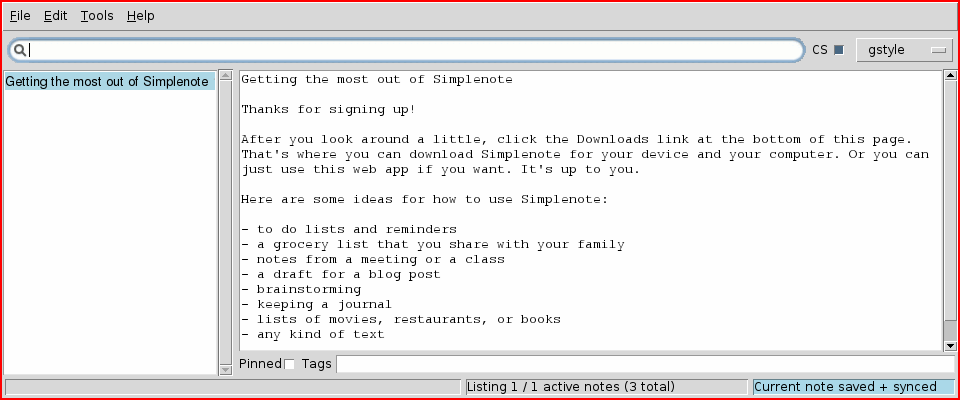nvPY is a fast, simple to use, no fuss, cross-platform note taking application. One of the big benefits is that all your notes are stored somewhere on the cloud – so you don’t need to worry about them!
Contents
Unfortunately we can not simply use emerge to install nvPY, so there are a few prerequisites prior to installation.
Prerequisites
There are not many prerequisites to nvPY but here they are all the same.
Simplenotes Account
In order to use nvPY, you will first need to create yourself a simplenotes account at simplenote.com. Now armed with your simplenotes login credentails, you can begin to install.
Git
Because vnpy is not available through the Gentoo package manager, we first need to make sure we have the git client installed so that we can download the source code.
emerge --ask git
Python
At the time of writing, nvpy works best with python version 2.7.x and it currently does not work very well yet with python 3.x. Also, nvpy requires that the python version to be used is compiled with support for TkInter.
I already have dev-lang/python-3.3.2-r2:3.3 install as my default. To install a lower version, like 2.7.x but keep 3.x as your default, do. Note, you will need to be root.
emerge -av python:2.7
If, like me, you already have python 2.7.x installed, make sure it is compiled with TkInter support. If not, as root, do the following.
echo "=dev-lang/python-2.7.5 tk" >> /etc/portage/package.use emerge --ask --newuse =dev-lang/python-2.7.5-r3
Installation
You should now be able to simply follow the instructions on github. To summarise (copy really I guess), see below. Make sure you do this as a normal user.
git clone git://github.com/cpbotha/nvpy.git cd nvpy python nvpy
Launch nvPY
In order to run nvPY, it first needs to be able to connect to your SimpleNotes account. So before you first try to run nvPY, create the following file, making sure only your normal user can read it.
nano ~/.nvpy.cfg
Populate it with only the following information. Obviously, replace the values on the right hand side of the equals sign with your SimpleNotes login credentials.
[nvpy]
sn_username = your_simplenote_username
sn_password = your_simplenote_password
Make sure only you can read it.
chmod -v 600 ~/.nvpy.cfg
Finally, try running it.
python2.7 nvpy &
Hopefully that worked!!

Yay!! Job done!
Resources
The Official Site – GitHub:
github.com/cpbotha/nvpy
How to install Python Tkinter in Gentoo Linux:
how-to.wikia.com/wiki/How_to_install_Python_Tkinter_in_Gentoo_Linux
How to choose python version to install in gentoo:
serverfault.com/questions/145856/how-to-choose-python-version-to-install-in-gentoo


Be the first to comment